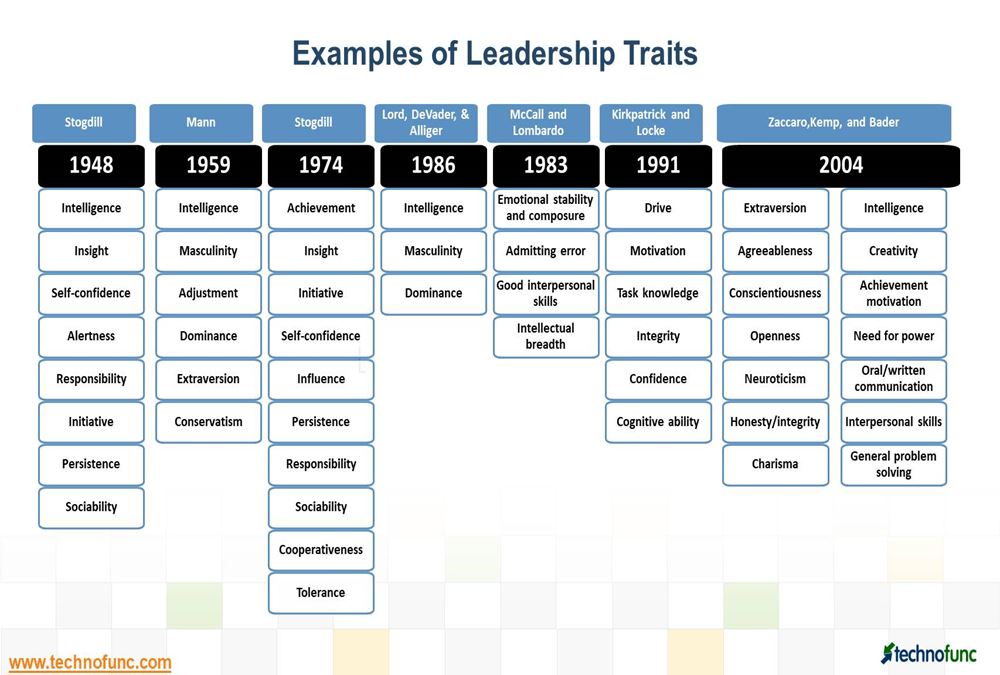- Home
- Business Processes
- Industry Knowledge
- Aerospace Industry
- Automotive Industry
- Banking Domain
- BFSI Industry
- Consumer/ FMCG Industry
- Chemicals Industry
- Engineering & Construction
- Energy Industry
- Education Domain
- Finance Domain
- Hospitality Domain
- Healthcare Industry
- Insurance Domain
- Retail Industry
- Travel and Tourism Domain
- Telecom Industry
- Leadership Skills
- eLearning
- Home
- Leadership
- Leadership Theories
- Trait Theory of Leadership
Trait Theory of Leadership
Trait Theory of Leadership is based on the assumption that people are born with inherited traits and some traits are particularly suited to leadership. The theory aims to discover specific leadership & personality traits and characteristics proven to predict the likelihood of success or failure of a leader.
What are Personality Traits?
The trait approach to personality is one of the major theoretical areas in the study of human personality and is focused on differences between individuals. The trait approach was one of the first systematic attempts to study leadership. The combination and interaction of various traits forms a personality that is unique to each individual. Trait theory is focused on identifying and measuring these individual personality characteristics known as Traits.
Traits: Also called dispositions, Traits can be defined as habitual patterns of behavior, thought, and emotion. Traits are relatively stable over time, differ across individuals and influence behavior. Traits are external behaviors that emerge from internal beliefs and processes.
What is Trait Theory of Leadership?
Trait Theory of Leadership is based on the assumption that people are born with inherited traits and some traits are particularly suited to leadership. People who make effective leaders have the right (or sufficient) combination of traits and great leaders has some common personality characteristics. Trait theories help us identify traits and dispositions that are helpful when leading others. This theory as described by Kelly (1974) attempts to classify what personal characteristics such as physical, personality and mental, are associated with leadership success. Trait theory relies on research that relates various traits to the success of a leader.
Quotes on Traits:
“Leadership consists not in degrees of technique but in traits of character; it requires moral rather than athletic or intellectual effort, and it imposes on both leader and follower alike the burdens of self-restraint.” - Lewis H. Lapham
“The screenwriters I know share a few personality traits and one of them is anxiety.” - Tony Gilroy
“I think in the end, when you're famous, people like to narrow you down to a few personality traits. I think I've just become this ambitious, say-whatever's-on-her-mind, intimidating person. And that's part of my personality, but it's certainly not anywhere near the whole thing.” - Madonna Ciccone
“The moment a person forms a theory, his imagination sees in every object only the traits which favor that theory” - Thomas Jefferson
Overview of Trait Theory of Leadership:
Early research on leadership was based on the psychological focus of the day, which was of people having inherited characteristics or traits. The trait theory of leadership focused on analyzing mental, physical and social characteristic in order to gain more understanding of what is the characteristic or the combination of characteristics that are common among leaders. There have been many different studies of leadership traits and attention was put on discovering these traits, often by studying successful leaders, but with the underlying assumption that if other people could also be found with these traits, then they, too, could also become great leaders.
Advantages of Trait Theory of Leadership:
The trait theory is naturally pleasing theory and gives constructive information about leadership. Lot of research has validated the foundation and basis of the theory and it can be applied by people at all levels in all types of organizations. Managers can utilize the information from the theory to evaluate their position in the organization and to assess how their position can be made stronger in the organization. It serves as a yardstick against which the leadership traits of an individual can be assessed and individuals can get an in-depth understanding of their identity and the way they will affect others in the organization. This theory makes the manager aware of their strengths and weaknesses and thus they get an understanding of how they can develop their leadership qualities. It gives a detailed knowledge and understanding of the leader element in the leadership process.
Examples of Leadership Traits:
A lengthy list of traits has been made to describe an effective leader in terms of certain characteristics. Given below is outcome of studies on leadership traits and characteristics with reference to timelines in terms of years:

Criticism / Arguments against - The Trait Theory of Leadership:
Many arguments are made against the leadership theory of traits and it has some inherent limitations as during the 1930s the field of Psychometrics was in its early years. The greatest argument is that if particular traits are key differentiator of leadership, then how do we explain people who possess these qualities but are not leaders? This question is one of the difficulties in using trait theories to explain leadership.
These characteristics according to some people are considered valid indicators of successful leaders, but if you compare leaders by various physical personality and intelligence traits, you may find very little agreement on these. Some findings point out to the fact that leaders are intelligent individuals. But they do not provide any clue as to whether leaders are brighter than their followers or are as close to them in intelligence.
This theory is quite complex and there is bound to be some subjective judgment in determining who is regarded as a ‘good’ or ‘successful’ leader and many of these factors are situational related factors. The followers have a significant effect on the job accomplished by the leader. Trait theory completely ignores the followers and the situations that also help a leader to be successful. To be more objective, traits of the person as well as demand of the situation together determine the effectiveness of the leader.
Some of the personality traits are overlapping with each other. Therefore, you need to be cautious in stating, personality or any other characteristic as a cause of successful leadership. You must ask the questions: Who is a successful leader? Is he far superior physically? Is he far brighter? Is he more mature as a person? Is he more motivated to achieve his goal? Does he have more consideration for his followers? Etc.
Moreover the list of possible traits tends to be very long and personality traits measurement weren't reliable across studies. More than 100 different traits of successful leaders in various leadership positions have been identified. These descriptions are simply generalities and there exists disagreement over which traits are the most important for an effective leader. This theory does not offer explanations between the relation of each characteristic and its impact on leadership. Some of the traits may describe a successful leader but predicting successful leaders on the basis of traits alone is not a correct approach.
Stogdill in 1948, suggested that no consistent set of traits differentiated leaders from non-leaders across a variety of situations implying that an individual with certain traits who has been successful in one situation might not be as effective in another situation and this led to researchers concluding that traits were to be considered as relative to the requirements of the situation.
Related Links
You May Also Like
-
Self-Fulfilling Prophecy (SFP) Leader Theory
Pygmalion theory of Leadership is a model of SFP at work involving supervisory expectancy based on the pygmalion effect. This effect is a type of self-fulfilling prophecy (SFP) in which raising leader's expectations regarding subordinate performance boosts the group's performance. Managers who are led to demand more from their team, lead the team to better performance. There is some evidence that the SFP effect does exists.
-
Situational Theories of Leadership
The situational theories of leadership assume that the most effective style of leadership depends from situation to situation. Situational leadership is a leadership style in which the leader must adjust to match the development needs of the followers. They must adapt varying behaviors to strike the right balance between task & relationship based on different levels of maturity of followers and also as followers develop and cultivate their skills.
-
Self-leadership is a normative model of self-influence by the use of several behavioral strategies to gain a comprehensive self-influence perspective about oneself. Self-leadership is developing an understanding of your capabilities and abilities to influence your own communication, emotions, and behaviors to lead and influence others. Self-leadership is about personal growth and developing foresight.
-
The development of teams is an ongoing process because the composition of the team may keep on changing. The new members may join and the old members may leave the team. The team members pass through several stages for the development of the team and there has been a lot of research to identify these stages. In this article, we discuss the common theories of team development.
-
Transactional Theory of Leadership
Transactional leadership theory is based on the concept of rewards and punishments. The transactional management approach assumes that the desires of the leader and follower are different and leaders give followers something in exchange for getting something they want. Transactional leaders expect followers to be compliant and focuses on structure, instruction, monitoring, organization, or performance to get tasks completed on time.
-
Robert Katz identified three leadership skills called - technical skills, human skills, and conceptual skills as the basic personal skills essential for leadership. Leaders must possess these three skills that assist them in optimizing a leader's performance. Technical skills are related to the field, human skills are related to communicating with people and conceptual skills related to setting the vision.
-
There are four major factors in leadership called Leader, Follower, Communication, and Situation. The success of the leader is dependent on how the leader is effectively able to communicate and motivate followers to perform desired tasks using the appropriate leadership style best suited for the given situation. Interdependencies and dynamics of these four factors of leadership must be considered by a leader to be effective.
-
In the field of communication studies, there are numerous models. No one model is suitable for all purposes and all levels of analysis. Some common models are known as Lasswell Model, George Gerbner Model, David Berlo Model, Shanon and Weaver Model, Osgoods Model, and Schramm Model. All these describe the four components of the communication process, namely, the source (communicator), the message, the channel, the receiver (audience).
-
The cognitive resource theory states the influence of the leader's resources on his or her reaction to stress. The cognitive resources of a leader are experience, intelligence, competence, and task-relevant knowledge. Stress is common in resource managing situations, and this cognitive theory emphasizes how intelligence and experience are each best under different stress situations. This theory is the reconceptualization of the Fiedler model.
-
The Valence Model of Leadership
The valence model of emergent leadership is based on a group-development sequence. As per the valence model, the process of emergent leadership passes through three distinct stages; Orientation, Conflict, and Emergence. Group members willingly start following and obeying the leader who has passed the "emergence threshold."
Explore Our Free Training Articles or
Sign Up to Start With Our eLearning Courses

About Us
Learning
© 2023 TechnoFunc, All Rights Reserved










